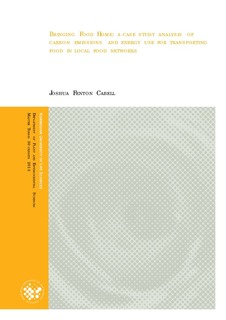Bringing Food Home : a case study analysis of carbon emissions and energy use for transporting food in local food networks
Master thesis
Permanent lenke
http://hdl.handle.net/11250/189571Utgivelsesdato
2013-08-05Metadata
Vis full innførselSamlinger
- Master's theses (IPM) [204]
Sammendrag
The global food system contributes up to 30% of anthropogenic GHG emissions, nearly a quarter of which comes from transporting and distributing food. A number of reports have pointed to the increase in “food miles” as one factor contributing to the food system’s climate impact. The local food movement arose as a challenge to this trend and today eating locally is now popular among eco-conscious consumers. However, numerous studies argue that measuring food’s climate impact is not as simple as reducing “food miles”, and that local food networks are not necessarily more climate friendly due to their heavy reliance inefficient modes of transport. One such local food network (LFN) is community-supported agriculture (CSA). To test this theory, I conducted a case study of a CSA located outside Norway’s capital city of Oslo. I analyzed carbon emissions and energy use to transport food from the farm to shareholders’ homes. Results show that emissions and energy use for transportation are significantly higher than in other food supply networks, both local and mainstream. They are also higher than life-cycle carbon emissions of production and distribution of food items available through mainstream channels. Seen strictly from the perspective of emissions and energy use per kilogram of product resulting from transporting food, eating locally in this case does not offer a less carbon-intensive alternative to the mainstream food supply chain. A sensitivity analysis demonstrates that scaling up the driving patterns of the case to other LFNs will lead to a significant jump in emissions. It also demonstrates that if the CSA model expands geographically and scales up production it can lead to reduced emissions. I conclude by discussing these results in the context of other aspects of sustainability and the responsibility for society at large, not just actors in local food networks, to take action on climate change.
